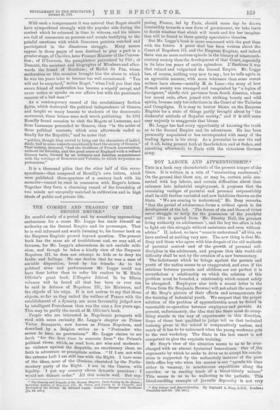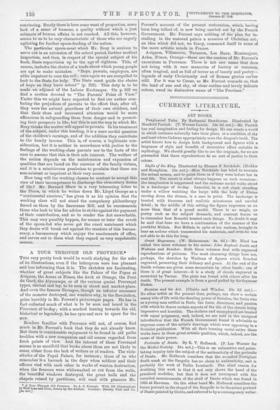BOY LABOUR AND APPRENTICESHIP.* THIS is a book very characteristic
of the present temper of the times. It is written in a vein of "unrelenting excitement."
On the ground that there are, or may be, certain evils con-
nected with boy labour, and certain difficulties about their entrance into industrial employment, it proposes that the
remaining vestiges of parental and personal responsibility shall be still further curtailed and new liabilities thrown on the State. "We are coming to understand," Mr. Bray remarks,
"that the period of adolescence forms a critical epoch in the
development of the lad. The forces of sin and those of virtue never struggle so hotly for the possession of the youthful soul' (this is quoted from 'Mr. Stanley Hall, the greatest
living authority on adolescence '1, and the boy too often is left to fight out this struggle without assistance and even without
advice." If, indeed, we have "come to understand" all this, we have arrived at nothing very new. The new thing is that Mr.
Bray and those who agree with him despair of the old methods of parental control and of the growth of personal self- discipline in the adolescent, and propose that this world-old difficulty shall be met by the creation of a new bureaucracy.
The indictment which he brings against the parents and youth of the nation seems to us exaggerated, and even if the relations between parents and children are not perfect it is nevertheless a relationship on which the solution of this problem must be founded, a relationship which cannot safely
be abrogated. Employers also (vide a recent letter in the Times from Sir Benjamin Browne) will not admit the accuracy a Mr. Bray's picture of their efforts and arrangements for
the training of industrial youth. We suspect that the proper solution of the problem of apprenticeship must be found in reasonable co-operation between employers and parents. At present, unfortunately, the idea that the State must do every. thing stands in the way of experiments in this direction. Some of those best qualified to judge tell us that technical training given in the school is comparatively useless, and much of it has to be unlearned when the young workman gets to the real workshop. The State in the last resort is not competent to give the requisite training.
Mr. Bray's view of the situation seems to us to be over- charged with an almost hysterical benevolence. One of „the arguments by which he seeks to drive us to accept his conclu- sions is supported by the melancholy instance of the poor little office boy who when his master is out "spends his time either in vacancy, in mischievous expeditions along the corridor, or in reading trash of a blood-thirsty nature." This seems to us to be wallowing in the pathetic. This blood-curdling example of juvenile depravity is not very • Doy Laboar and Apprenticeship. By Reginald A. Bray, L.C.C. London Constable and Co. Ells, net.]
convincing. Surely there is here some want of proportion, some lack of a sense of humour, a quality without which a just estimate of human affairs is not reached. All this, however, seems to us to be very characteristio of those who are eagerly agitating for further spoon-feeding of the nation.
The particular spoon-meat which Mr. Bray is anxious to serve out is an exteneion of the school period, further medical inspection, and then, in respect of the special subject of his book, State supervision up to the age of eighteen. This, of course, includes the choice of a trade about which young people are apt to make mistakes. "Boys, parents, employers, are alike impotent to cure the evil ; once again we are compelled to look to the State for help. The State must guide the choice of boys as they leave school" (p. 222). This duty is to be made an adjunct of the Labour Exchanges. On p. 202 we find a section devoted to "The Parents' Point of View.' Under this we might have expected to find our author com- bating the prejudices of parents to the effect that, after all, they were the natural guardians of their own children, and that their close and interested attention would be more efficacious in safeguarding them from danger and in promot- ing their prospects in life; but this is not the way in which Mr. Bray thinks the matter will appeal to parents. In hie treatment of the subject, under this heading, it is a mere sordid question of the children's earnings, and of the addition they contribute to the family income. This is, of course, a legitimate con- sideration, but it is neither in accordance with justice to the feelings of the working-class parents nor to the facts of the case to assume that this is their sole interest. The welfare of the nation depends on the maintenance and expansion of qualities that are based on the exercise of the family virtues, and it is a mischievous pessimism to proclaim that these are non-existent or impotent at their very source.
How long will the working classes be content to accept this view of their incompetence to discharge the elementary duties of life P Mr. Bernard Shaw in a very interesting letter to the Times, in which he writes down Mr. Lloyd George as a "sentimental amateur," has given it as his opinion that the working class will not stand the compulsory philanthropy forced on them by the Insurance Bill, and he recommends those who look to him for advice to strike against the payment of their contribution, and so to render the Act unworkable. This may very possibly happen, for sooner or later the revolt of the spoon-fed who never get the exact nutriment which they desire will break out against the creators of this bureau- cracy, a bureaucracy which enjoys the emoluments of office, and serves out to them what they regard as very unpalatable messes.























































 Previous page
Previous page